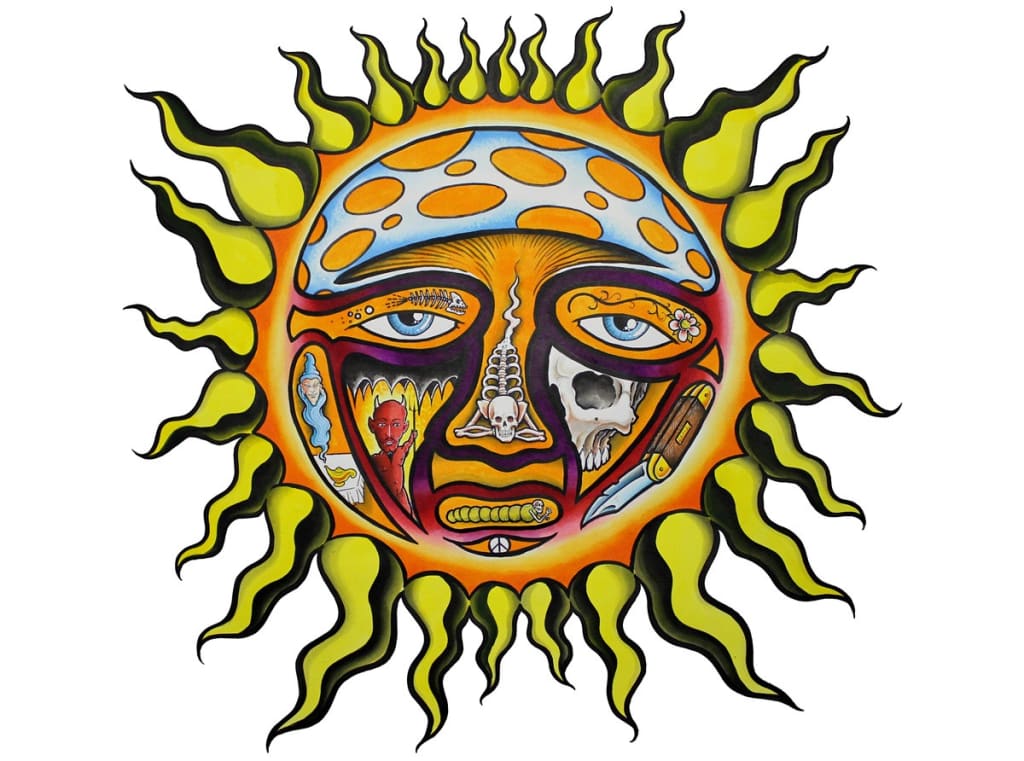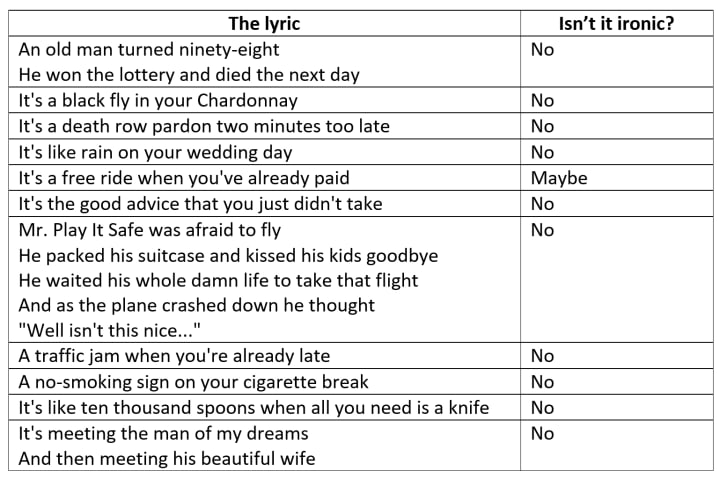A review of music from 1996
No Doubt, Michael Jackson, Tupac, Jewel, Alanis Morissette, Tracey Chapman and more

Pop asks ecclesiastical questions
While pop songs with spiritual undertones were not new, mainstream acts tended to leave overt religious themes to Christian rock groups. Not so in 1996. There were two big religious songs that year. The better one was Jewel’s Who will save your soul? The song is about a materialistic society full of people ready take advantage of others to get ahead. People aren’t cartoonish villains though, they are left wondering about the scars their actions have left on their souls. People ask god for salvation but without knowing what god even is. Hence we’re all looking for someone, anyone, to save us and we’re so desperate that it might just be a devil that answers our pleas.
Then there was Joan Osborne’s One of Us which asks the question, “What if god were one of us?” The song wonders what it would be like if God was an ordinary man, or even if he was a lonely slob. And, according to the song, if you saw god then “you would have to believe in things like heaven and in Jesus and the saints and all the prophets.” Which is a quite a bit of nonsense. If “god” is an ordinary man then what why is he special at all? How does he confirm anything? If you take the song at face value though it’s very pro-religion (that god is great and good is mentioned several times) yet it did spark some controversy for Ms. Osborne. Some listeners thought that you shouldn’t mention god so much unless you were an unambiguously religious performer.
The racist anti-racism song
By 1996 Michael Jackson was whiter than most Caucasians but he still cared about issues affecting blacks. He went to the Santa Marta, one of Rio de Janeiro’s most notorious favelas to film a music video for the song They Don’t Really Care About Us. Politicians attempted to stop him, afraid of how he would make their city look. Mr. Jackson was undeterred, he knew who he actually needed permission from--the drug barons who ruled the slum. He filmed there, surrounded by ecstatic fans. Besides being a hit song the video highlighted the poverty of the slum to the world. An embarrassed Brazil realized that the favelas would have to be cleaned up if they ever wanted to host an Olympics. So in that aspect the song was a huge success.
In another way the song caused a backlash that Michael Jackson was wholly unprepared for. It contained the lyrics “Jew me, sue me…Kick me, kike me” bringing charges of anti-Semitism. American radio stations were reluctant to play it. Mr. Jackson explained in response "It's not anti-Semitic because I'm not a racist person.” So there you go.
Exit: 2pac, Enter: Makaveli
It was possible to say a number of unkind things about rapper Tupac Shakur; one thing you couldn’t call him though was a poser. His “Thug Life” tattoo was not an indication of a troubled past, it was still very much his life even as a successful recording artist. He had the dubious distinction of being the first artist to have a number one song while incarcerated. On September 7th his lifestyle caught up with him when he was shot in a drive by shooting and died on September 13th.
Tupac had already released the hugely successful album All Eyez on Me in 1996 but he was not one to rest on his laurels. He also recorded The Don Killuminati: The 7 Day Theory, which was released shortly after his death. That album would be the beginning of an urban myth about how Tupac wasn’t really dead at all. Even a person who wasn’t interested in conspiracy theories would have to admit there were several odd things about the album. Where All Eyez on Me was largely full of party jams, Don Killuminati, was much darker and full of references to death. On it Tupac proclaimed a new stage name “Makaveli” in homage to the strategist Niccolò Machiavelli. Faking one’s death to fool your enemies might be described as Machiavellian. On the cover of the album it showed Tupac being crucified. Of course the most famous person in history to be crucified didn’t really die at all but came back in three days. There were seven days between Tupac’s shooting and his death—What exactly did The 7 Day Theory mean? Or what did Killuminati mean? A combination of “kill” and the mysterious center of many conspiracy theories, the illuminati?
Of course none of that actually means that Tupac faked his death. Still the fact that he has released more albums since his death than when he was alive raises some eyebrows.
The inescapable song
How it became the number one song of the year was a bit of a mystery. Everybody seemed to hate it. That didn’t stop people from dancing to it though. Perhaps the key to its success was the simple dance that went along with the song. You could almost do the whole thing without standing up. It was played repeatedly at the democratic convention and when Bob Dole fell off a stage he blamed it on the Macarena.
Perhaps one of the greatest mysteries surrounding Macarena was how so many people didn’t seem to really understand it even though the lyrics were quite clear. Few people seemed to know what Macarena meant (a nickname for a seductive girl) or fully grasp what the song was about (infidelity). So a song that was actually full of very adult themes was frequently played at family friendly events. Perhaps the fact that part of the song was in Spanish just caused people to stop listening to the words. The band Los del Rio wrote the damn thing and even they didn’t seem to appreciate the song’s adult nature—they released a Christmas version.
The stadium song
You had to watch the music video indirectly to avoid inducing an epileptic attack. Even if you could understand what the lyrics were they didn’t make any sense. One thing was clear though, the band Republica was Ready to Go. Ready to go where? Ready to do what? Not important. They were ready.
Ready to Go was Republica’s only big hit but they made the most of it. At least a dozen versions of the song exist. It was the perfect thing to play in a movie, TV show, commercial or sporting event to show that somebody was prepared to proceed, equipped to exit, or all set to set off.
Ska’s big year
Ska music had been steadily growing on underground music scenes for years when it exploded in 1996. At the head of the pack was No Doubt and Sublime.
No Doubt had two very successful albums in 1995 but they wouldn’t release their most popular song as single until April 1996. Don’t Speak, with its dark, raw lyrics about the real life break up of Lead singer Gwen Stefani and bassist Tony Kanal, was a huge hit. It was the most played song on the radio for a then record 16 weeks.
Meanwhile Sublime had their biggest song with What I Got. “Lovin’ is what I got” explain the lyrics. The song is not about love for a woman but rather love for life in general. Why get stressed about money when you can get high and hang out with a Dalmatian? The song became a stoner anthem.
The last big trend in rock, grunge, was on the wane. It looked like ska was the next big thing. And then it just wasn’t.
No Doubt’s next album wouldn’t come out till 2000 and then it was a bit of a disappointment. They started trying out different musical styles in later efforts. Sublime front man Bradley Nowell was already dead by the time the self-titled album that included What I Got was released. The band managed to dig up enough material to release several more albums but their impact was limited. No other bands stepped up to keep ska going.
What is irony?
Different people have fairly different ideas about what the word “ironic” means. One definition is “using words to convey a meaning that is the opposite of its literal meaning.” This possibly means that word most often used ironically is “ironic” itself. More broadly we can think of something being ironic when the effect of an action is the opposite of what was desired. One reason why people might be confused about what it means to be “ironic” is Alanis Morissette. Ms. Morissette plainly seems to have irony confused with simple bad luck or coincidences. Let’s examine the song Ironic.

The only one that might be ironic is kind of confusing. How is it a free ride if you’ve paid?
Years later Eliza and Rachael Hurwitz released a spoof entitled It’s Finally Ironic with lyrics like “It’s like rain on your wedding day/A day and place you chose/Because it’s known not to rain.” That’s the same event but now it’s ironic because choosing that day and place had the exact opposite effect as desired. The girls also add “We fixed it for you Alanis/You’re Welcome.”
The Old Soul
If you’d never heard it before and you were told that Give Me One Reason was a remake of a song by an obscure blues man, you’d probably believe it. The song has a slow deepness to it that makes it feel much older than it is.
The song is about heartbreak, but not of the usual kind. Singer Tracey Chapman tells a story not of being cheated on, abused, dumped, nor betrayed in any way. Rather she tells of the sinking realization that she has put more effort into the relationship than the other person. Hence she’s made the reluctant decision to leave her partner, made all the more difficult by the fact that she still has feelings of love. Her decision is not absolute though, she’ll stay if her partner will only make an effort to reciprocate her feelings (I avoid using the word “he” or “she” because the song never mentions the gender of the person Ms. Chapman is singing to). That is to say, she’ll stay if she can only be given one reason why she should.
Rival Paradises
In 1995 Coolio scored the biggest hit of his career with Gangsta’s Paradise. Rather than glorifying the gangster’s lifestyle it was a soul bearing song about how once someone was involved in the criminal underworld it was near impossible to get out or even be understood and the end result was often an early grave. The movie Dangerous Minds is probably only remembered because footage from it was used in the music video for Gangsta’s Paradise. The song’s appeal extended beyond rap fans. It won Coolio a Grammy along with numerous other awards.
In 1996 Weird Al parodied the hell out of it with Amish Paradise.
Weird Al writes original songs all the time but his most popular songs have always been parodies of pop songs. Amish Paradise was one of his strongest spoofs because he didn’t just replace the lyrics with food jokes but rather turned the entire concept of the song on its head. Where Coolio sings about living fast, doing dirty deeds and dying young, Al sings about living anachronistically slow, keeping squeaky clean and having the comfort of knowing heaven awaits after dying (from where he will laugh at outsiders who mocked him in life). The video made the whole thing even crazier, while Al merely states that “Jebediah feeds the chickens” in the video we can see that Jebediah is feeding the chickens with pizza.
Coolio did not appreciate Amish Paradise, stating that he thought the subject of his song was too serious and that he hadn’t given permission for the satire. It turns out though that you don’t need anyone’s permission to write a joke song and everyone enjoyed Amish Paradise too much to stop listening to it, regardless of Coolio’s feelings.
About the Creator
Buck Hardcastle
Viscount of Hyrkania and private cartographer to the house of Beifong.






Comments
There are no comments for this story
Be the first to respond and start the conversation.